Search
Remove Ads
Advertisement
Summary 
Loading AI-generated summary based on World History Encyclopedia articles ...
Search Results
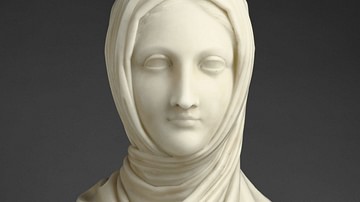
Definition
Vestal Virgin
Vestal Virgins (Latin: Vestales) were the priestesses of the Roman goddess of the hearth, Vesta, in the state religion of ancient Rome. At varying times there were four to six priestesses employed. They were the only full-time clergy (collegia...
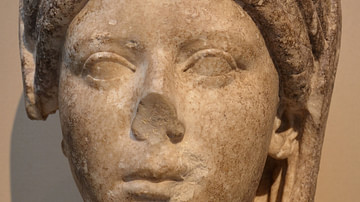
Image
Vestal Virgin, British Museum
Marble head from a portrait statue of a veiled priestess of the goddess Vesta. The headdress identifies the subject as a Vestal Virgin. Above her hair are six folds of the infula, a long woolen band wrapped around the head to hang in two...

Image
Vestal Virgin by Canova
Antonio Canova (Italian, 1757 - 1822 CE)
Herm of a Vestal Virgin, 1821 - 1822, Marble
Object: H: 49.8 x W: 31.9 x D: 24.1 cm (1 ft. 7 5/8 in. x 1 ft. 9/16 in. x 9 1/2 in.)
The J. Paul Getty Museum, Los Angeles

Video
The Roman Goddess Vesta and her Vestal Virgins
The goddess Vesta was the Roman goddess of the home, the hearth, fire, domestic life, and the patroness of bakers. She is identified with the Greek goddess Hestia, although Hestia was less so in the spotlight in ancient Greece than Vesta...

Video
House of the Vestal Virgins (Atrium Vestae) - Ancient Rome Live
The house of the Vestal Virgins is one of the most famous sites in the Roman Forum area. Six Vestals cared for the sacred flame of the Temple of Vesta and many other sacred duties, for 30 years of service, under the guidance of the Pontifex...

Article
Love, Sex, & Marriage in Ancient Rome
Love, sex, and marriage in ancient Rome were defined by the patriarchy. The head of the household was the father (the pater familias) who had complete control over the lives of his wife, children, and slaves. This paradigm was justified...
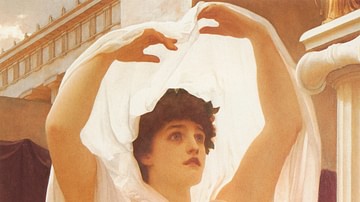
Definition
Vesta
Vesta was the goddess of the hearth, the home, and domestic life in the Roman religion (idenitified with the Greek goddess Hestia). She was the first-born of the titans Kronos and Rhea and, like the others, was swallowed by her father. When...
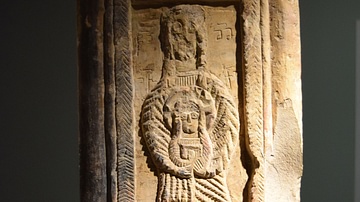
Image
Fragment of a Stele of the Virgin Mary from Georgia
This fragment was rediscovered in Davati village, located in eastern Georgia, in 1980. It was originally made in the 6th century CE from limestone. The standing figure of the Virgin Mary represents a unique iconographic type of the Virgin...
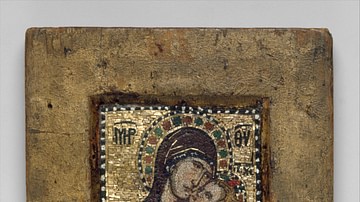
Image
Byzantine Mosaic Icon with the Virgin Eleousa
Portable icon of the Virgin and Child of the Eleousa type, the Virgin of Tenderness, miniature mosaic made of many tiny tesserae (mosaic stones), set in wood, early 14th century.
Metropolitan Museum of Art, New York.
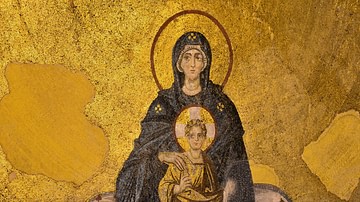
Image
The Virgin and Child Mosaic, Hagia Sophia
The Virgin and Child mosaic, 9th century CE, Hagia Sophia, Istanbul, Turkey. The mosaic is located in the apse semi-dome of Hagia Sophia. In the mosaic Mary is enthroned and she puts her right hand on the shoulder of the Child Christ who...